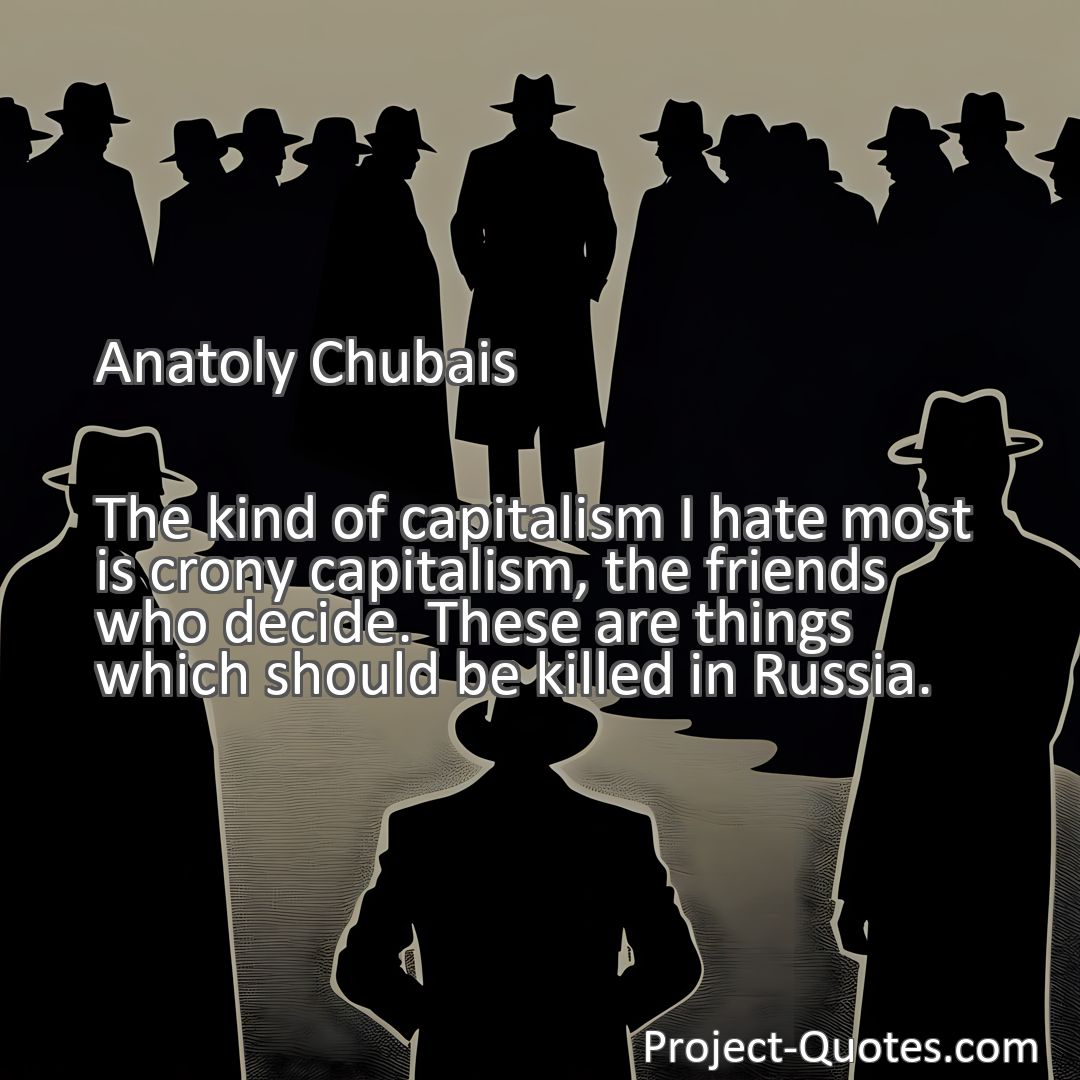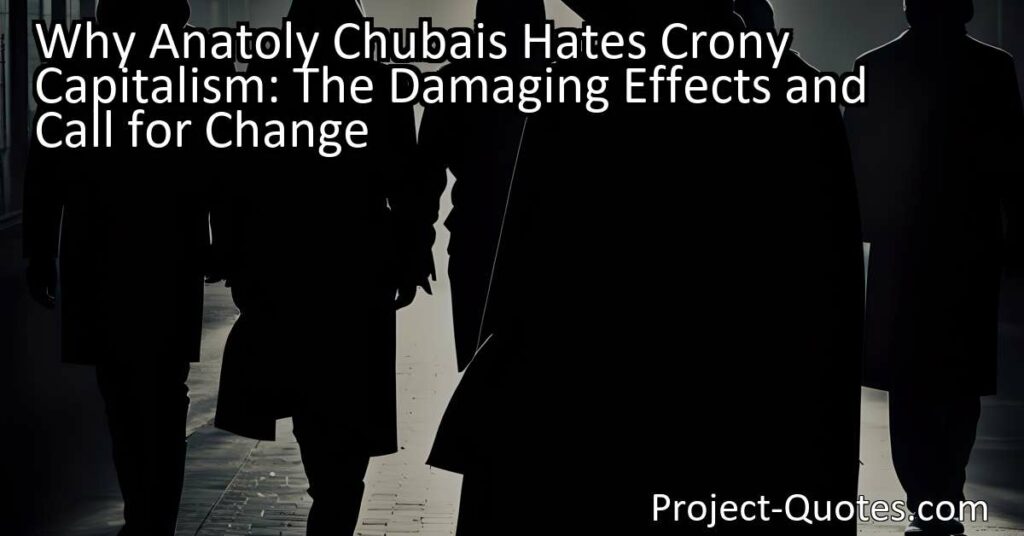The kind of capitalism I hate most is crony capitalism, the friends who decide. These are things which should be killed in Russia.
Anatoly Chubais
Crony capitalism’s damaging effects extend beyond economic disparities. Anatoly Chubais, a prominent Russian economist and politician, despises this distorted form of capitalism where influential friends make decisions that benefit a select few. He advocates for transparency, fairness, and a level playing field to combat crony capitalism and create a more equitable and prosperous society for all.
Table of Contents
- 1 The kind of capitalism I hate most is crony capitalism, the friends who decide. These are things which should be killed in Russia.
- 2 Anatoly Chubais
- 3 Meaning of Quote – The kind of capitalism I hate most is crony capitalism, the friends who decide. These are things which should be killed in Russia.
- 4 Freely Shareable Quote Image
- 5 Related
Meaning of Quote – The kind of capitalism I hate most is crony capitalism, the friends who decide. These are things which should be killed in Russia.
Have you ever heard of the term “crony capitalism”? It’s a type of capitalism that many people, including Anatoly Chubais, dislike immensely. In fact, Chubais goes as far as saying it’s the kind of capitalism he hates the most. But what exactly is crony capitalism and why does it bother him so much? Let’s delve into this topic together and explore why Chubais believes it should be eliminated from Russia.
To put it simply, crony capitalism refers to a system in which businesses thrive not solely based on their merits or fair competition, but rather due to their close relationships with influential individuals or government officials. These “friends” in power often make decisions that favor a select few, granting them unfair advantages in the business world. This kind of behavior goes against the principles of true capitalism, where success should be determined by hard work, innovation, and market forces.
Anatoly Chubais, a prominent Russian economist and politician, believes that crony capitalism is a plague that needs to be eradicated. He understands that when the friends of those in power control the economy, it leads to a lack of transparency, inefficiency, and corruption. Such a system stifles progress, inhibits fair competition, and hinders the development of a healthy economy.
Chubais recognizes that capitalism, when implemented correctly, can be a powerful force for growth and prosperity. It encourages entrepreneurship, innovation, and self-reliance. However, when undue influence and personal connections take precedence over the fundamental principles of free markets, the system becomes perverted and unjust.
In the case of Russia, the presence of crony capitalism has been a persistent issue. Following the collapse of the Soviet Union, Russia underwent a major transition from a centrally planned economy to a market-based one. However, this transition was marred by corruption and the emergence of powerful oligarchs who amassed immense wealth and control over key industries. These oligarchs, often referred to as the “friends who decide,” used their connections and influence to gain incredible advantages that were unavailable to the rest of the population.
Chubais, who played a significant role in Russia’s privatization efforts during this transition, experienced firsthand the detrimental effects of crony capitalism. He witnessed how the friends of those in power reaped the benefits of privatization, while the average citizens were left struggling to make ends meet. This stark inequality fueled his determination to fight against the corrupt system that had taken hold in Russia.
The negative consequences of crony capitalism extend beyond economic disparities. Chubais acknowledges that it erodes public trust in the government and damages the overall social fabric of a country. When people perceive that success is solely based on who you know, rather than what you know, it creates a sense of disillusionment and injustice. This can lead to political unrest, social unrest, and an increased likelihood of corruption becoming even more entrenched.
In order to combat crony capitalism, Chubais believes that Russia must undergo a transformation. He advocates for increased transparency, the strengthening of institutions, and the creation of a level playing field for all businesses. By restraining the influence of the “friends who decide,” he hopes to foster an environment that encourages fair competition and rewards merit.
Chubais is not alone in his fight against crony capitalism. Many economists, activists, and reformers throughout the world share his concerns and recognize the need for change. In fact, several countries have taken steps to address this issue by implementing stricter regulations, enhancing corporate governance, and promoting transparency in business dealings.
It is essential to understand that crony capitalism is not exclusive to Russia; it exists in varying degrees in many countries. While the specific manifestations might differ, the underlying issues and criticisms remain similar. The fight against crony capitalism requires a collective effort to prioritize fairness, honesty, and equal opportunities.
In conclusion, Anatoly Chubais, an influential figure in Russian politics and economics, despises crony capitalism. He believes that this distorted form of capitalism, where influential friends make decisions that benefit a select few, is detrimental to society. With his firsthand experience of the negative consequences of crony capitalism in Russia, Chubais advocates for transparency, fairness, and the creation of a level playing field. The fight against crony capitalism extends beyond Russia and should be a global endeavor, as it undermines the principles of free markets and justice. By working together to tackle this issue, we can strive for a more equitable and prosperous society for all.
I hope this quote inspired image brings you hope and peace. Share it with someone who needs it today!


